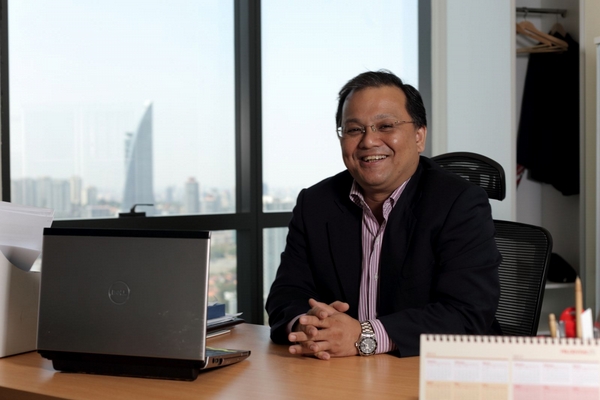How Sabah's palm oil can compete
Published on: Thursday, November 15, 2018

Kota Kinabalu: Sabah's palm oil output not only competes with Asian producers but also India, Africa, Central and South America. Prices are at all time-low since three years ago, and more complaints were received by large plantation and smaller growers burdened with growing costs.Positioning Sabah's palm oil output as sustainably produced and certified as such by the Roundtable on Sustainable Palm Oil (RSPO) helps in its marketability demand globally especially for 110,000 smallholders around the world who just contribute 2.5 per cent of the world's Certified Sustainable Palm Oil (CSPO) supply.
ADVERTISEMENT
Some 300 delegates from all over the world are attending the 16th Annual Roundtable Conference on Sustainable Palm Oil (RT16) held at the Magellan Sutera Resort. "RSPO's global guidelines are for producing palm oil sustainably." 2018 has been a pivotal year for RSPO with the review of the RSPO Principles and Criteria (P&C) 2013 and will be submitted for ratification by RSPO's 15th Annual General Assembly (GA15) on Thursday.The RSPO P&C are a set of environment and social standards which RSPO member companies must comply with in order to produce Certified Sustainable Palm Oil (CSPO).Representatives from the global palm oil industry met here to discuss the latest challenges and opportunities facing the sustainable palm oil value chain, as well as key elements of the recent RSPO Principles and Criteria (P&C) review: halting deforestation, protecting peatlands, strengthening human and labour rights, as well as the subsequent development of an additional and separate standard specifically for independent smallholders, due for ratification in November 2019.
ADVERTISEMENT
Thereafter, members of the RSPO's 15th Annual General Assembly (GA15) will gather to vote on a number of resolutions, including the new proposed P&C, which, if endorsed will become the RSPO P&C 2018.The current draft of the RSPO P&C 2018 incorporates aims to halt deforestation through the identification, maintenance and enhancement of High Conservation Values (HCV) and High Carbon Stock forests.
ADVERTISEMENT
Oil palm growers with land below 50 hectares are considered small holders. "RSPO acknowledges the significance of smallholders and the need for a change to current practices and approaches to improve their inclusion into the RSPO system."This has been a key area of focus and discussion for RSPO and its stakeholders with its P&C review at this meeting themed 'A Renewed Commitment to Achieving Market Transformation'."RSPO seeks to transform markets to make sustainable palm oil the norm," said its CEO Datuk Darrel Webber.To date, "RSPO has been supporting smallholders through a variety of different approaches including funding support programmes through the RSPO Smallholder Support Fund (RSSF), development of 'Guidance for Group Certification of FFB Production' and the Smallholder Academy."RSPO has been working hard to address the issue of deforestation. The last RT9 in 2011 was held here in Kota Kinabalu emphasised sustainability and launched many involved parties on the way to sustainability.Webber said RSPO also creates consciousness for national sustainable palm oil such as ISPO for Indonesia and MSPO for Malaysia. Sabah has gone forward with RSPO jurisdictional certification."RSPO certification helps our palm oil to be accepted by the food industry particularly in Europe where fossil fuel use like diesel is being lessened for vehicles with talks going forward towards electric cars."Palm oil is among the world's most consumed food ingredients and is currently being utilised in about half of all packaged food products. Through their fruits, oil palms are highly efficient, year-round producers of edible oil and blend oil for biodiesel.Growing sales of palm oil in recent years has contributed significantly to economic growth and alleviating poverty in a number of developing countries including Malaysia.Webber denied that the near extinction of Sabah's and other Sumatran rhinoceros is due to the monocropping of oil palm impacting on flora and fauna biodiversity.He told Daily Express that the "particular diet, solidarity lifestyle and reproduction habit of the rhinoceros" contributed to its fate, and that RSPO members have done more for conservation of orang utan habitats and minimise human-elephant conflicts. "An area of more than 263,000 hectares of High Conservation Values (HCV) land, equivalent to almost 350,000 football fields has been set aside and managed by RSPO members – a 39 percent increase from the previous reporting year."This week, RSPO released their 2018 Impact Report (period from July 1, 2017 to June 30, 2018).It was agreed that as of Friday this week, no new planting is allowed on peat soil by RSPO, and peat area is to be designated as peat conservation areas. There were even calls for removal of oil palm planted on peat areas or at least no replanting on peat soil.This hopefully minimises peat fire incidents that contribute to air pollution that plague not only the grower nation but also neighbouring countries. Hence, one of the most urgent issues facing palm oil producing countries is deforestation and peatland protection, as well as the associated destruction of biodiversity.To further assist with overcoming the challenges of fire, haze, subsidence, and flooding from cultivating on peatlands, and to reduce greenhouse gas (GHG) emissions, the current Principles and Criteria (P&C) draft also requires all existing planting on peat to adhere to the latest version of 'RSPO Manual on Best Management Practices (BMPs) for existing oil palm cultivation on peat'."I am pleased to note among other impact highlights, the reduction of carbon dioxide (CO2) emissions found through GHG assessment submissions received since 2015 from the conservation of peatlands, equivalent to removing the emissions of more than 110,000 cars in just one year. We commend our members for their efforts and I hope we can continue to see this kind of progress across the board year-on-year," Darrel Webber said.Stay up-to-date by following Daily Express’s Telegram channel.
Daily Express Malaysia




